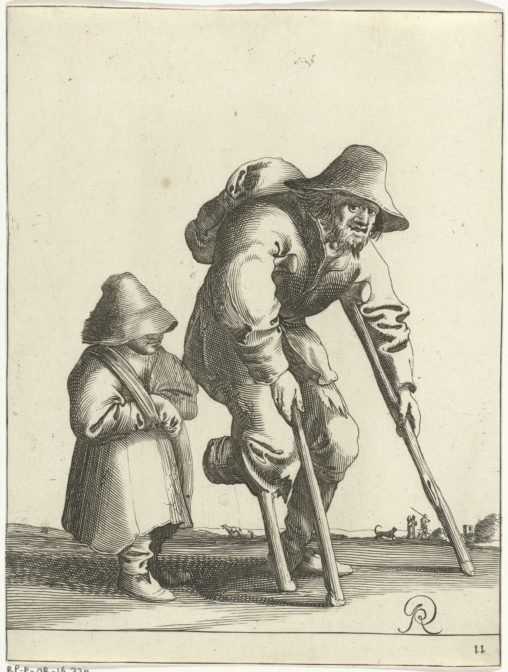An armenjager is a poor hunter, an official charged with driving away beggars.
By the end of the 1600s, poor economic conditions caused many people to turn to begging. Churches and towns provided for their own people, but strangers had no choice but to beg. To prevent these strangers from taking charity that could be used by the towns’ own folks, some towns hired an armenjager to get rid of them. They were usually put across the border of the municipality or province to make them somebody else’s problem.
An instruction for poor hunters in Dalfsen, Overijssel from 1700 shows that they should make daily rounds. If they found a beggar that was not from Dalfsen, they had to disarm him, take any money he made begging, and drive him away.1

Beggar and child, 1630s. Credits: Pieter Jansz. Quast, collection Rijksmuseum (public domain)
Sources
- “Instructie voor twee angestelte arme jagers,” transcription, PDF, Mijn Stad Mijn Dorp (https://stichting-ijsselacademie.mijnstadmijndorp.nl/verhalen/armenjagers-in-de-18e-eeuw-in-het-bijzonder-het-overijsselse-geslacht-magre : accessed 15 January 2018).


Many countries where poverty was a problem found their own ways of dealing with the issue. We moderns have our own cruel methods. In the 19th c. in London, the largest city in the world at the time, and probably the one where the disparity of wealth was the greatest, at least two methods were used. People who at some point had had money but for some reason fell into debt, were put into debtor’s prison until they were able to repay their debt. This wasn’t very realistic. Among those who had lived in poverty all their lives, people were corralled, often in family groups, and put into workhouses, where they were given extremely menial tasks to do in order to “earn their keep.” In both cases, many starved to death. In the workhouses, many of the children were toddlers, and others were born there. Their work could be as menial as taking apart old clothing, and remaking them so the workhouse could sell them.
In the 18th c. in New England, families or individuals who moved into a town and seemed likely to become poverty stricken later in their lives were “warned out.” After doing some research on the subject, I learned that towns felt an obligation to take care of those who had been born there, should poverty befall them later. But if strangers moved in as adults, or even as children with their parents, and seemed likely not to be able to support themselves, officials applied this label to them in official records. Should they later become poverty stricken, each member of the family had to return to the town where they were born. One consequence could be that families would be separated. Two of my ancestors were “warned out” when they moved to a small New Hampshire town shortly after their marriage. In fact, they were each born in different towns, so if they had actually become poor, or ill, as in your illustration, they would have had to return to their separate birthplaces. As it turned out, their eight children were all born in this town, and the couple both were buried there. I don’t know where they died, but I presume it was where they were buried. But having the label applied to them when they moved to the town must have made them feel pretty unwelcome!